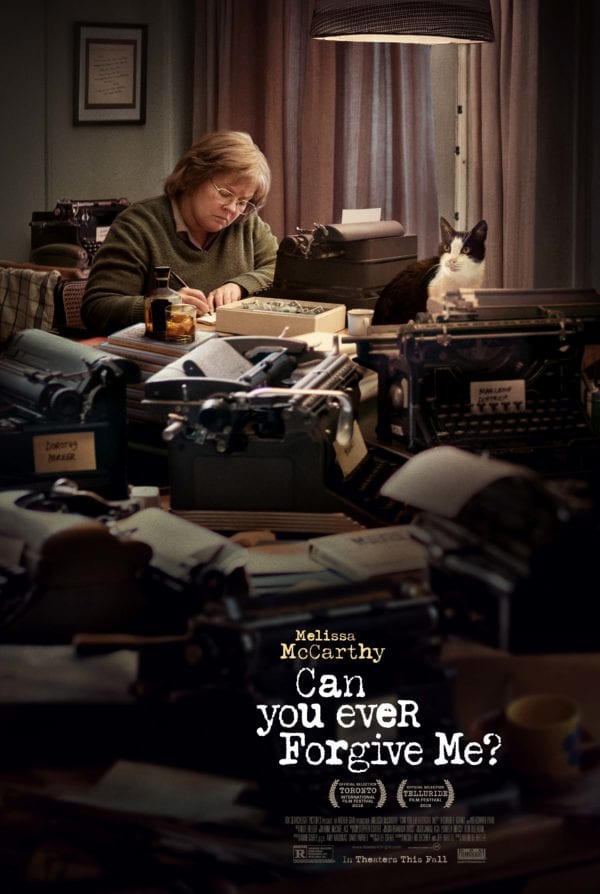Red Stewart chats with Anne McCabe about Can You Ever Forgive Me?…
Anne McCabe is an American film editor who has been working in the film and television industries since the late-1980s. She is best known for her work on projects like Adventureland, Nurse Jackie, and Top Five.
Flickering Myth had the privilege to talk to her about her editing on the Melissa McCarthy film Can You Ever Forgive Me?, and I in turn had the honor to conduct it:
Looking over your filmography, I have to say I admire the American Dream-esque progression you’ve made since the beginning of your career. You started off doing apprenticeship and assistant roles before making your way to supervisory positions. For you personally, what was it like moving through these different layers of the editing business? Do you feel it was beneficial to go through them, rather than jump right into a full-scale editing position?
As an apprentice and assistant, I had a lot of wonderful opportunities to watch some really great editors at work like Andy Mondshein, Susan Morse and Billy Scharf. I think the apprentice and assistant route gives you some perspective on the craft and also for me, I was really ready and eager to cut by the time I was given a chance.
In the 90s you used to do some music editing. What caused you to drop it in your contemporary career? Do you ever plan on going back to it?
Music editing was a lot of fun and great training! I do a ton of music editing while picture editing now so the experience was so useful. Also when I was first working as an assistant music editor I got to work on bigger budget movies. It was great to be challenged by working on all types of projects. I have worked on documentaries, TV shows network and cable, commercials, low budget features and bigger budget moves, you can learn a lot from all the different types of entertainment. I don’t see going back but you never know. I am trying to stay employed!
Even though you have a very diversified background, it seems for your feature length project choices, you’ve gone with comedy-dramas like Adventureland, Thanks for Sharing, Top 5, and of course Can You Ever Forgive Me? Comedy is generally seen as a significantly different genre than drama, so what is your approach to conveying the duality of the two? Is it hard to balance serious moments with lighthearted ones without causing tonal jumbling?
I love working in comedy and I feel very comfortable in that genre but my favorite genre is drama that has humor. Navigating the tone is always tricky but it is for me the best type of editing. It takes a lot of work finding the right beats but when it is successful, it is so satisfying. There is nothing like being at a screening of a movie or a show where you can watch the audience cry at one moment and then burst into laughter at another and you feel that you have helped make these moments work. Sometimes the drama makes the comedy work even better because you were able to work in surprising and unexpected comic moments which jerk the audience out of a dramatic scene. It is so important to keep the audience on their toes by switching up the types of scenes and moments.
On that note, let’s talk about Can You Ever Forgive Me?. This is a biographical picture about disgraced author Lee Israel who forged letters to help gain back her reputation as a writer, as well as to make a living. People lying to make it big in the world is something we have frequently seen over the decades, such as with James Frey and A Million Little Pieces. As someone working in a competitive industry, what were your own thoughts on the story of Lee Israel, and did your personal feelings affect your editing decisions?
If you read her book you can see that the real Lee Israel, though clever and entertaining, was a pretty horrible person and she was quite narcissistic. In the movie version, Melissa McCarthy plays a much more layered and complex role. The director, Marielle Heller, wanted Lee’s character to be a suffering artist who has romantic yearnings and has an attachment to the past. Though Lee is deeply flawed, the audience empathizes with her from the beginning. She is funny, she takes no crap from anyone and she refuses to back down. She’s not a particularly good criminal but she is incredibly good at writing these letters and in her friendship with Jack and Anna, you see how she wishes for connection. In the edit, we were very aware that we needed the audience to be on Lee’s side without watering down her character flaws.
Click below to continue on to the second page…












